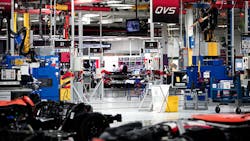How We Use Manufacturing Technology Now ... and Will in the Future
What does the future hold for manufacturing technology? More consumer devices, certainly, more automation, more wearables, more of everything connected to the Industrial Internet of Things. If you want more than that, turn to the Amazing Kreskin or Carnac the Magnificent, the turbaned seer of Tonight Show fame.
Or just spend some time with the recent State of Manufacturing Technology report from Plex Systems.
Plex surveyed more than 130 manufacturers on the technologies they use today and any emerging technologies they plan to incorporate in the future. For reference, close to 50% of these manufacturers operate internationally, more than 67% operate multiple facilities, 89% reported rising revenue during the last five years, and 39% reported a revenue increase of more than 20%. Like any survey, this one has a small margin of error, but it’s a more accurate reflection of the industry and its future than most forecasts.
Among the more surprising facts to emerge from the report is that 90% of manufacturers surveyed said data security either wasn’t affected or was actually improved after the adoption of cloud solutions, which Plex chief technology officer Jerry Foster described as “fascinating.”
“When we first started out with cloud, about 15 years ago, that was a very real concern among some of our potential customers,” he said. “What we’ve seen over the years is that that concern has curbed significantly. … It’s a point I make often: Just because your data is in your data center doesn’t make it secure.”
Also surprising, though in the other direction, is that just 40% said they drew a direct correlation between cloud technologies and their ability to innovate during the next five or so years — “Some of them might not have realized some of the benefits of the cloud. I do think the actual number would be much higher than that,” Foster said — though 73% said they plan to enhance quality programs as a result of cloud.
Consumer devices are everywhere, of course, including on the shop floor. Already, 93% said they use consumer tablets — the Apple iPad, the Microsoft Surface, or competitors — in their current manufacturing operations. (And while Microsoft Windows remains the preferred operating system, 64% said they provide Apple iPhones or iPads to employees compared to just 45% that provide Android devices.)
Overall, 80% said they would incorporate consumer mobile devices into their operations, rather than industry-specific devices.”They’re ubiquitous, they’re cost-effective, they’re basically a terminal in everyone’s pocket. Why wouldn’t we go that route?” Foster said. “You still have the question, ‘How do I secure that? How do I secure the data?’ But you have that with any technology. It’s just a different way of looking at it.”
Beyond consumer devices, manufacturers remain mixed about devices like smart glasses, particularly Google Glass: 36% said they’re likely to incorporate the technology in the next five years, and an almost-equal 35% said smart glasses are overhyped, a statistic Foster said might come from just “being tired of hearing about” the technology.
Add up all those connected devices and, “Between mobility and the Internet of Things, I’m convinced the PC will disappear from the shop floor in the next five years,” Plex vice president of development Jason Prater said. “Manufacturers won’t need them. Computers will be everywhere, though many will be hidden.”
Data analysis will also likely increase in importance, based on the 35% that said it’s the most important skill set for their employees — just ahead of mechanical engineering (29%), and far ahead of software engineering (12%), design (11%) and electrical engineering (4%).
“What’s going to happen on the shop floor if we don’t have the workers who can handle it?” Foster said. “Collecting data is almost child’s play, but if it’s not helping me, what’s the point? Once I have all the data, I have to be able to do something with it, or it’s just a waste of time.”
Technology like automation and the IIoT should allow manufacturers to run smarter factories. Install smart lights that will trim power and HVAC costs, connect workers and heavy equipment with sensors to cut down on accidents and fatalities, even attach individual tools to increase efficiency and eliminate mistakes.
As always, early adopters will find the technology, innovators will figure out how best to use it, and the rest will catch up sooner or later — though, really, sooner seems like the much better option here.
About the Author
Matt LaWell
Staff Writer
Staff writer Matt LaWell explores news in manufacturing technology, covering the trends and developments in automation, robotics, digital tools and emerging technologies. He also reports on the best practices of the most successful high tech companies, including computer, electronics, and industrial machinery and equipment manufacturers.
Matt joined IndustryWeek in 2015 after six years at newspapers and magazines in West Virginia, North Carolina and Ohio, a season on the road with his wife writing about America and minor league baseball, and three years running a small business. He received his bachelor's degree in magazine journalism from Ohio University.
